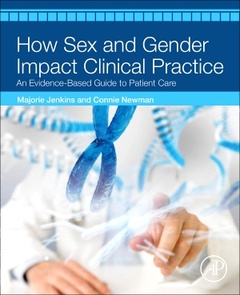Description
How Sex and Gender Impact Clinical Practice
An Evidence-Based Guide to Patient Care
Coordinators: Jenkins Marjorie R., Newman Connie B.
Language: English
Subject for How Sex and Gender Impact Clinical Practice:
Keywords
Sex and gender; stroke; congestive heart failure; COPD; asthma; Alzheimer’s disease; multiple sclerosis; diabetes; obesity; osteoarthritis; osteoporosis; autoimmune diseases; depression; PTSD; anxiety; irritable bowel syndrome; Crohn’s Disease; cancer; fibromyalgia; domestic violence; opioids; tobacco
360 p. · 21.4x27.6 cm · Paperback
Description
/li>Contents
/li>Readership
/li>Biography
/li>Comment
/li>
How Sex and Gender Impact Clinical Practice: An Evidence-Based Guide to Patient Care enables primary care clinicians by providing a framework to understand differences and better care for patients in their practice. Each chapter covers a subspecialty in medicine and discusses the influence of sex hormones on disease, along with sex and gender-based differences in clinical presentation, physical examination, laboratory results, treatment regimens, comorbidities and prognosis. Illustrative case examples and practical practice points help each chapter come alive. A special chapter on communication differences between men and women assists clinicians in their conversations with patients.
This book fills an important need by applying years of research findings to sex and gender specific medical care and demonstrating that an individualized approach to patient care will lead to improved detection, treatment and prevention of disease.
Section I: The Importance of Sex and Gender in Patient Care 1. Application of Sex and Gender Health: A Practical Framework 2. Clinician-Patient Communication: Gender Influences
Section II: Sex and Gender Evidence in Health and Disease 3. Addiction: Sex and Gender Evidence in Alcohol, Tobacco, and Opioids Substance Use Disorders 4. Autoimmune Diseases: Sex and Gender Evidence in Rheumatoid Arthritis, Systemic Lupus Erythematosus, and Ankylosing Spondylitis 5. Cancer Screening and Prevention: Sex and Gender Evidence in Lung, Breast, and Colorectal Cancer 6. Cardiovascular Disease: Sex and Gender Evidence in Acute Ischemic Syndrome and Heart Failure 7. Gastrointestinal Diseases: Sex and Gender Evidence in Liver Lesions, Gastroesophageal Reflux, and Inflammatory Bowel Disease 8. Mental Health: Sex and Gender Evidence in Schizophrenia, Depression, and Anxiety Disorders 9. Metabolic Disorders: Sex and Gender Evidence in Dyslipidemia, Diabetes, and Obesity 10. Musculoskeletal Disorders: Sex and Gender Evidence in ACL Injuries, Osteoarthritis, and Osteoporosis 11. Neurological Diseases: Sex and Gender Evidence in Stroke, Migraine, and Alzheimer’s Dementia 12. Pharmacology: Sex and Gender Evidence in Medication Safety and Efficacy 13. Public Health in Your Practice: Sex and Gender Considerations in Access to Healthcare, Immunizations, and Intimate Partner Violence 14. Respiratory Diseases: Sex and Gender Evidence in Obstructive Sleep Apnea, COPD, and Asthma
Section III: Beyond Point of Care: Sex and Gender Influences in the Community of Practice 15. The Business of Medicine: Making the Case for a Sex and Gender Practice 16. Knowledge Resources in Sex and Gender Health
Biomedical researchers in endocrinology, cardiology, neuroscience, development biology, medical students, residents, and practicing physicians from all medical areas.
Adjunct Professor of Medicine at the New York University Grossman School of Medicine, is Board Certified in Internal Medicine, Endocrinology and Metabolism, and Obesity Medicine. She is a Fellow of the American College of Physicians, the American Heart Association, the American Medical Women’s Association (AMWA), and the New York Academy of Medicine. She served as the 2018-2019 President of AMWA, an organization of women physicians, pre-medical and medical students that advocates for advancement of women in medicine, health equity and sex and gender based medical education. Dr. Newman is recognized for her expertise in hypercholesterolemia, hypertriglyceridemia, statin safety, and randomized controlled clinical trials. She is the Chair of the 2020 Endocrine Society clinical practice guideline on the management of dyslipidemia in endocrine diseases, and served as Chair of the writing group for the American Heart Association’s 2019 Scientific Statement on the safety of statins. Dr. Newman is an appointed member of the FDA Endocrine and Metabolic Disorders A
- Explores the effects of sex and gender on disease presentation, treatment and prognosis, and how these differences influence clinical decision-making
- Provides practical guidance that helps clinicians implement a more individualized approach to patient care
- Contains information on diseases in each major specialty, as well as chapters on communication, pharmacology and public health challenges

